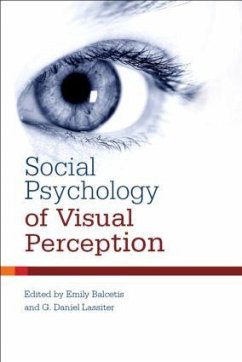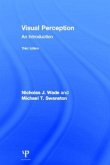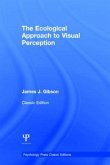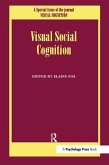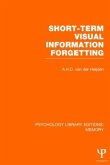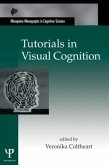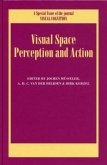Social Psychology of Visual Perception
Herausgeber: Balcetis, Emily; Lassiter, G Daniel
Social Psychology of Visual Perception
Herausgeber: Balcetis, Emily; Lassiter, G Daniel
- Gebundenes Buch
- Merkliste
- Auf die Merkliste
- Bewerten Bewerten
- Teilen
- Produkt teilen
- Produkterinnerung
- Produkterinnerung
This volume synthesizes social, cognitive, ecological, evolutionary, and neuroscience research, demonstrating that the way in which people literally perceive the world changes with their cognitions, emotions, goals, motivations, culture, surroundings, and other factors traditionally considered exclusive to social, personality, and cognitive psychology.
Andere Kunden interessierten sich auch für
![Theories of Visual Perception Theories of Visual Perception]() Ian E GordonTheories of Visual Perception168,99 €
Ian E GordonTheories of Visual Perception168,99 €![Visual Perception Visual Perception]() Nicholas WadeVisual Perception204,99 €
Nicholas WadeVisual Perception204,99 €![The Ecological Approach to Visual Perception The Ecological Approach to Visual Perception]() James J GibsonThe Ecological Approach to Visual Perception179,99 €
James J GibsonThe Ecological Approach to Visual Perception179,99 €![Visual Social Cognition Visual Social Cognition]() Elaine Fox (ed.)Visual Social Cognition179,99 €
Elaine Fox (ed.)Visual Social Cognition179,99 €![Short-Term Visual Information Forgetting (Ple: Memory) Short-Term Visual Information Forgetting (Ple: Memory)]() A H C van der HeijdenShort-Term Visual Information Forgetting (Ple: Memory)52,99 €
A H C van der HeijdenShort-Term Visual Information Forgetting (Ple: Memory)52,99 €![Tutorials in Visual Cognition Tutorials in Visual Cognition]() Tutorials in Visual Cognition179,99 €
Tutorials in Visual Cognition179,99 €![Visual Space Perception and Action Visual Space Perception and Action]() Dirk Kerzel / Jochen Msseler (eds.)Visual Space Perception and Action121,99 €
Dirk Kerzel / Jochen Msseler (eds.)Visual Space Perception and Action121,99 €-
-
-
This volume synthesizes social, cognitive, ecological, evolutionary, and neuroscience research, demonstrating that the way in which people literally perceive the world changes with their cognitions, emotions, goals, motivations, culture, surroundings, and other factors traditionally considered exclusive to social, personality, and cognitive psychology.
Produktdetails
- Produktdetails
- Verlag: Taylor & Francis
- Seitenzahl: 352
- Erscheinungstermin: 12. April 2010
- Englisch
- Abmessung: 236mm x 156mm x 25mm
- Gewicht: 603g
- ISBN-13: 9781848728042
- ISBN-10: 1848728042
- Artikelnr.: 37009517
- Verlag: Taylor & Francis
- Seitenzahl: 352
- Erscheinungstermin: 12. April 2010
- Englisch
- Abmessung: 236mm x 156mm x 25mm
- Gewicht: 603g
- ISBN-13: 9781848728042
- ISBN-10: 1848728042
- Artikelnr.: 37009517
Emily Balcetis is an Assistant Professor of Psychology at New York University. She received her Ph.D. in 2006 from Cornell University in Social and Personality Psychology. Her research provides a comprehensive examination of the pervasiveness of motivational biases in visual perception and decision-making, exploring both conscious and unconscious effects using a balance between traditional and high-tech, novel techniques, paradigms, and approaches. G. Daniel Lassiter is Professor of Psychology at Ohio University. He received his Ph.D. in 1984 from the University of Virginia, completed a two-year postdoctoral fellowship at Northwestern University, and held a visiting position at the University of Florida before arriving at his present institution in 1987. For more than two decades, he has conducted research on the mechanisms underlying people's perceptions of the behavior of others, including investigations of the consequences of variation in the behavior-perception process for social judgment and decision-making. During this period, he developed a theoretically driven program of scholarship aimed at examining the effect of presentation format on how mock jurors evaluate confession evidence, which was one of the earliest psychologically oriented research programs on this topic.
J. Bruner
Foreword: A New Look at the New Look. E. Balcetis
G. Daniel Lassiter
Introduction. Part 1. Motivation and the Social Psychology of Visual Perception. K. Pauker
N.O. Rule
N. Ambady
Ambiguity and Social Perception. D. Isaacowitz
H. Fung
Motivation Across Time and Place: What Gaze Can Tell Us About Aging and Culture. S. Duffy
S. Kitayama
Cultural Modes of Seeing Through Cultural Modes of Being: Cultural Influences on Visual Attention. E. Balcetis
D. Dunning
Wishful Seeing: Motivational Influences on Visual Perception of the Physical Environment. L. Johnston
L. Miles
N. Macrae
Male or Female? An Investigation of Factors that Modulate the Sex-Categorization of Strangers. Part 2. Neuroscience and the Social Psychology of Visual Perception. M. Weierich
L. Feldman Barrett
Affect as a Source of Visual Attention. R. Todd
A. Anderson
The Role of the Amygdala in Vision. M.P. Viggiano
T. Marzi
Context and Social Effects on Face Recognition. L.M. Oberman
P. Winkielman
V.S. Ramachandran
Embodied Simulation: A Conduit for Converting Seeing into Perceiving. Part 3. Ecological Approach to the Social Psychology of Visual Perception. G.D. Lassiter
M. Lindbergh
J. Ratcliff
L. Ware
A.L. Geers
Top-down Influences on the Perception of Ongoing Behavior. K. Johnson
J. Freeman
A New Look at Person Construal: Seeing Beyond Dominance and Discreteness. J. Stefanucci
Emotional High: Emotion and the Perception of Spatial Layout. J. Montepare
"Cue
View
Action:" An Ecological Approach to Person Perception.
Foreword: A New Look at the New Look. E. Balcetis
G. Daniel Lassiter
Introduction. Part 1. Motivation and the Social Psychology of Visual Perception. K. Pauker
N.O. Rule
N. Ambady
Ambiguity and Social Perception. D. Isaacowitz
H. Fung
Motivation Across Time and Place: What Gaze Can Tell Us About Aging and Culture. S. Duffy
S. Kitayama
Cultural Modes of Seeing Through Cultural Modes of Being: Cultural Influences on Visual Attention. E. Balcetis
D. Dunning
Wishful Seeing: Motivational Influences on Visual Perception of the Physical Environment. L. Johnston
L. Miles
N. Macrae
Male or Female? An Investigation of Factors that Modulate the Sex-Categorization of Strangers. Part 2. Neuroscience and the Social Psychology of Visual Perception. M. Weierich
L. Feldman Barrett
Affect as a Source of Visual Attention. R. Todd
A. Anderson
The Role of the Amygdala in Vision. M.P. Viggiano
T. Marzi
Context and Social Effects on Face Recognition. L.M. Oberman
P. Winkielman
V.S. Ramachandran
Embodied Simulation: A Conduit for Converting Seeing into Perceiving. Part 3. Ecological Approach to the Social Psychology of Visual Perception. G.D. Lassiter
M. Lindbergh
J. Ratcliff
L. Ware
A.L. Geers
Top-down Influences on the Perception of Ongoing Behavior. K. Johnson
J. Freeman
A New Look at Person Construal: Seeing Beyond Dominance and Discreteness. J. Stefanucci
Emotional High: Emotion and the Perception of Spatial Layout. J. Montepare
"Cue
View
Action:" An Ecological Approach to Person Perception.
J. Bruner
Foreword: A New Look at the New Look. E. Balcetis
G. Daniel Lassiter
Introduction. Part 1. Motivation and the Social Psychology of Visual Perception. K. Pauker
N.O. Rule
N. Ambady
Ambiguity and Social Perception. D. Isaacowitz
H. Fung
Motivation Across Time and Place: What Gaze Can Tell Us About Aging and Culture. S. Duffy
S. Kitayama
Cultural Modes of Seeing Through Cultural Modes of Being: Cultural Influences on Visual Attention. E. Balcetis
D. Dunning
Wishful Seeing: Motivational Influences on Visual Perception of the Physical Environment. L. Johnston
L. Miles
N. Macrae
Male or Female? An Investigation of Factors that Modulate the Sex-Categorization of Strangers. Part 2. Neuroscience and the Social Psychology of Visual Perception. M. Weierich
L. Feldman Barrett
Affect as a Source of Visual Attention. R. Todd
A. Anderson
The Role of the Amygdala in Vision. M.P. Viggiano
T. Marzi
Context and Social Effects on Face Recognition. L.M. Oberman
P. Winkielman
V.S. Ramachandran
Embodied Simulation: A Conduit for Converting Seeing into Perceiving. Part 3. Ecological Approach to the Social Psychology of Visual Perception. G.D. Lassiter
M. Lindbergh
J. Ratcliff
L. Ware
A.L. Geers
Top-down Influences on the Perception of Ongoing Behavior. K. Johnson
J. Freeman
A New Look at Person Construal: Seeing Beyond Dominance and Discreteness. J. Stefanucci
Emotional High: Emotion and the Perception of Spatial Layout. J. Montepare
"Cue
View
Action:" An Ecological Approach to Person Perception.
Foreword: A New Look at the New Look. E. Balcetis
G. Daniel Lassiter
Introduction. Part 1. Motivation and the Social Psychology of Visual Perception. K. Pauker
N.O. Rule
N. Ambady
Ambiguity and Social Perception. D. Isaacowitz
H. Fung
Motivation Across Time and Place: What Gaze Can Tell Us About Aging and Culture. S. Duffy
S. Kitayama
Cultural Modes of Seeing Through Cultural Modes of Being: Cultural Influences on Visual Attention. E. Balcetis
D. Dunning
Wishful Seeing: Motivational Influences on Visual Perception of the Physical Environment. L. Johnston
L. Miles
N. Macrae
Male or Female? An Investigation of Factors that Modulate the Sex-Categorization of Strangers. Part 2. Neuroscience and the Social Psychology of Visual Perception. M. Weierich
L. Feldman Barrett
Affect as a Source of Visual Attention. R. Todd
A. Anderson
The Role of the Amygdala in Vision. M.P. Viggiano
T. Marzi
Context and Social Effects on Face Recognition. L.M. Oberman
P. Winkielman
V.S. Ramachandran
Embodied Simulation: A Conduit for Converting Seeing into Perceiving. Part 3. Ecological Approach to the Social Psychology of Visual Perception. G.D. Lassiter
M. Lindbergh
J. Ratcliff
L. Ware
A.L. Geers
Top-down Influences on the Perception of Ongoing Behavior. K. Johnson
J. Freeman
A New Look at Person Construal: Seeing Beyond Dominance and Discreteness. J. Stefanucci
Emotional High: Emotion and the Perception of Spatial Layout. J. Montepare
"Cue
View
Action:" An Ecological Approach to Person Perception.

